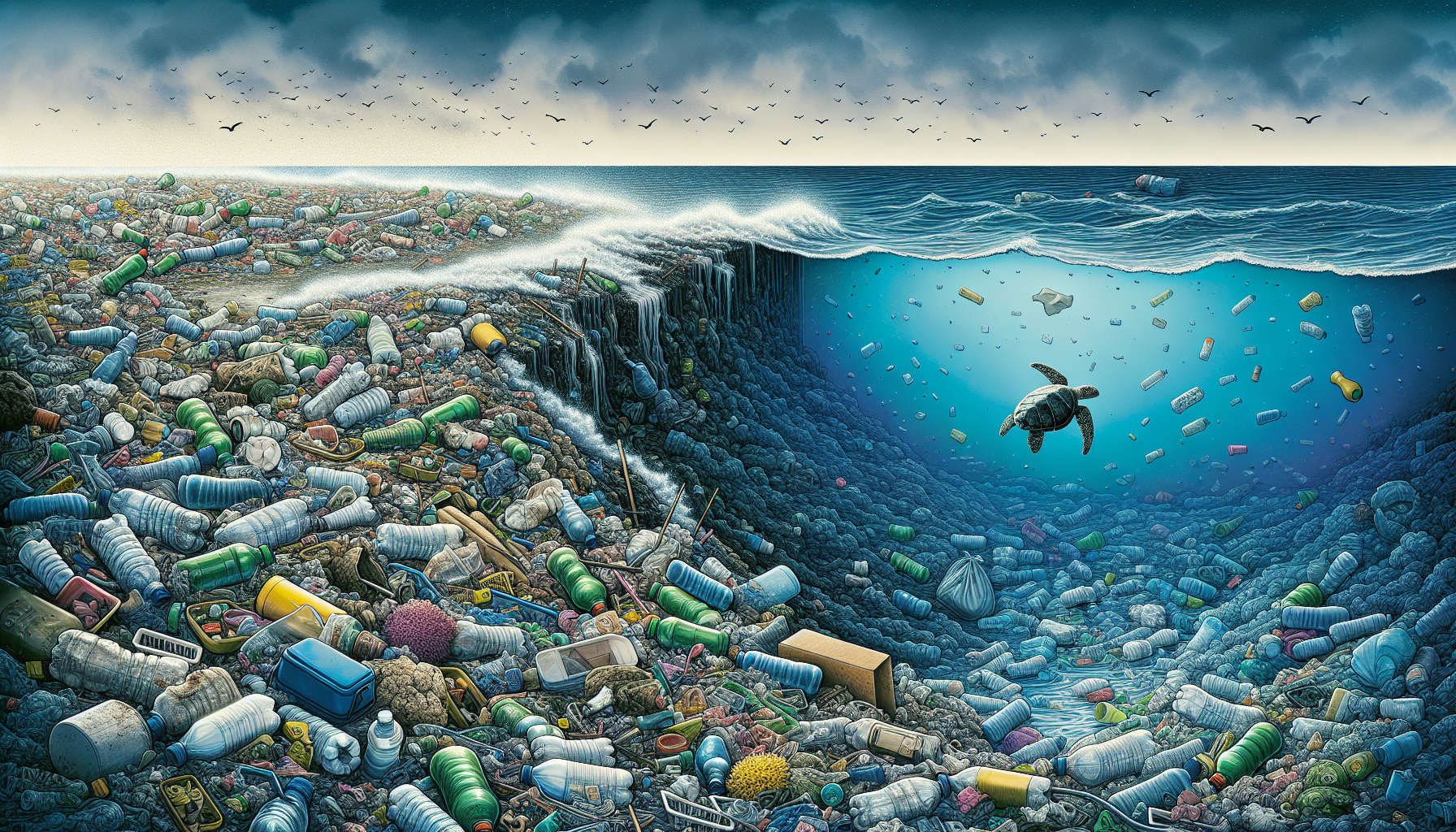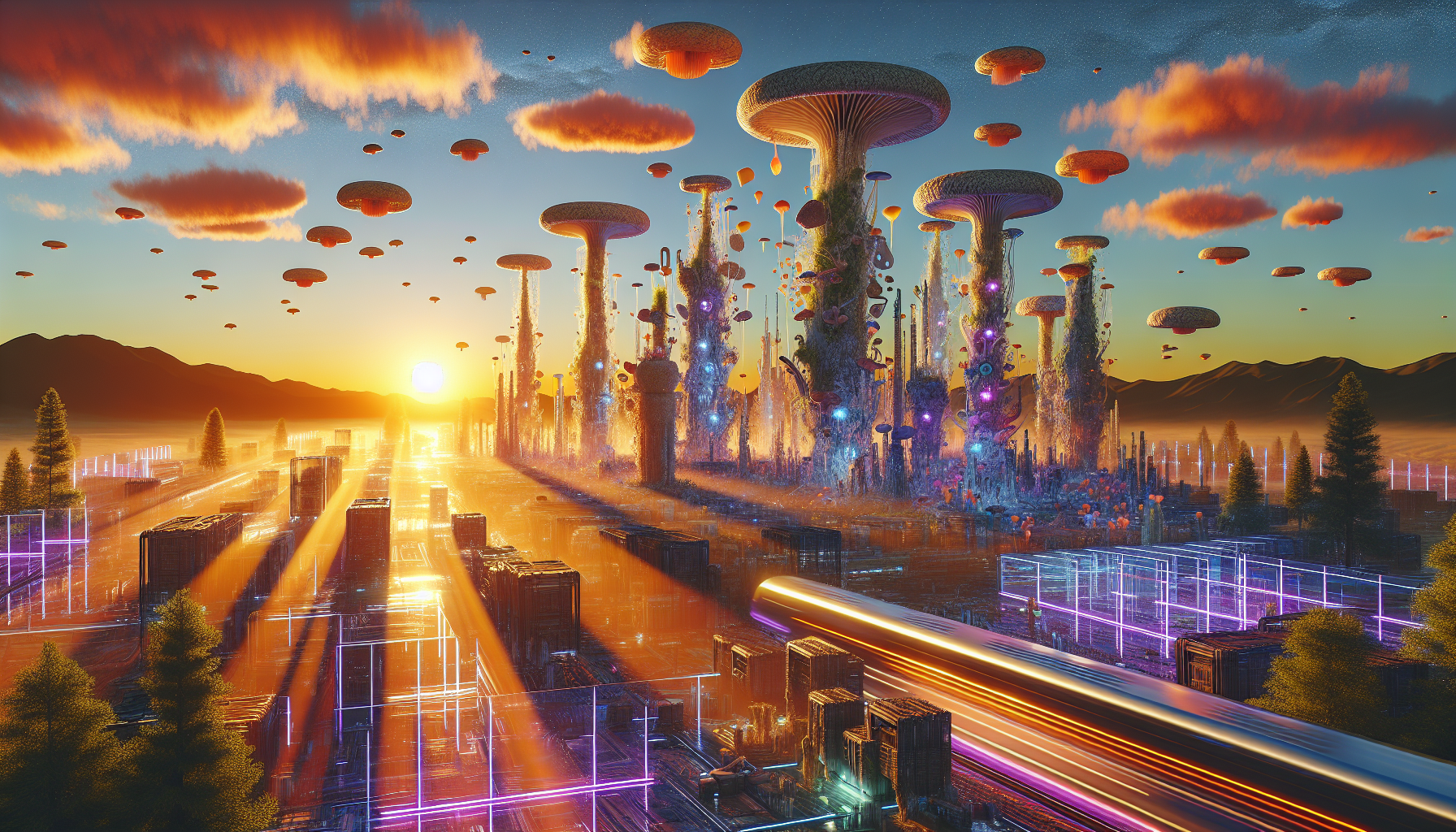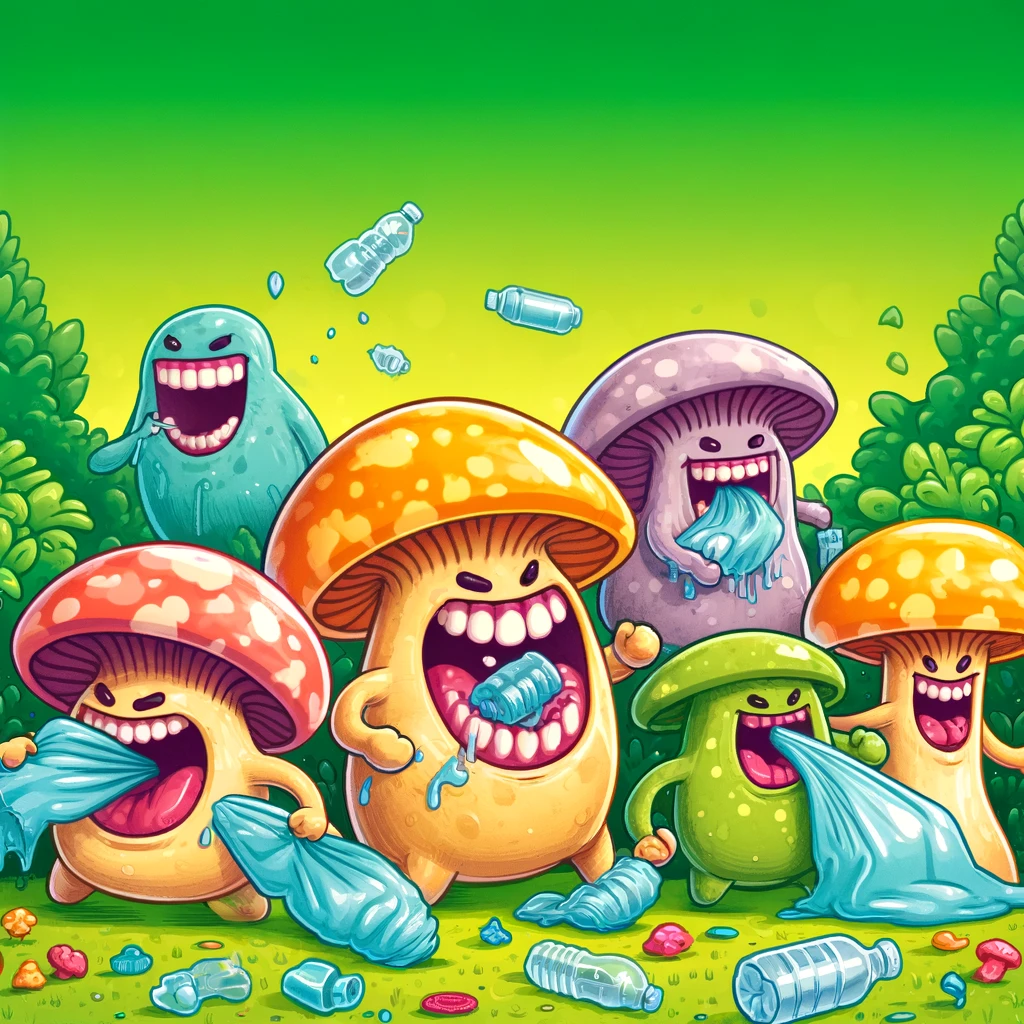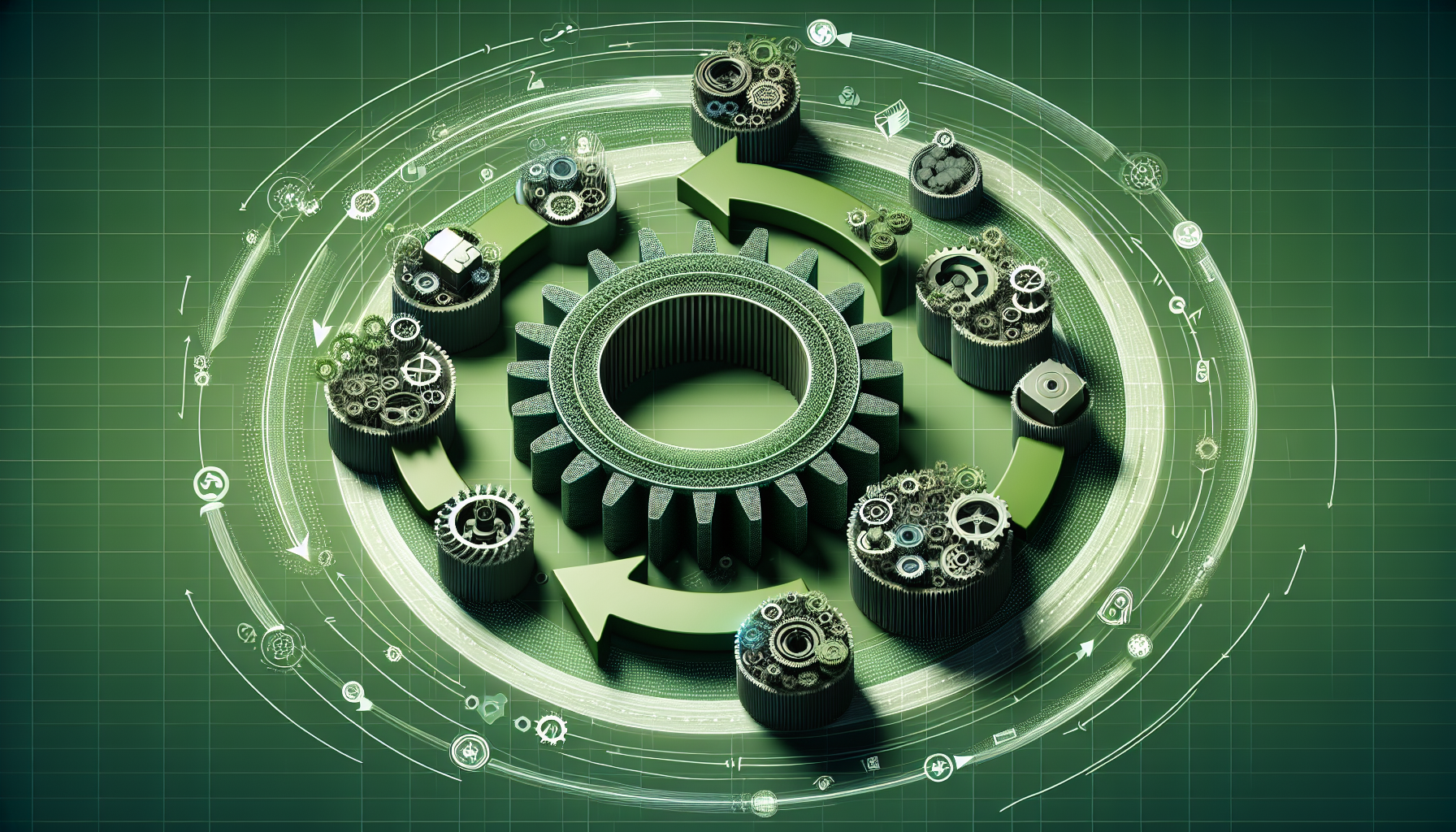Plastic & the Planet: Empowering Change for Earth Day 2024
As we celebrate Earth Day 2024, a pivotal question emerges: how can we reduce our plastic footprint to benefit the planet? This article explores the inspiring potential of algae and fungi as game-changers in the battle between plastic and the planet. We delve into groundbreaking innovations and worldwide initiatives that are leading us toward a sustainable future.
Join us on this hopeful journey to understand the stakes and discover how each of us can contribute to Earth’s wellbeing by embracing these natural solutions.
Plastic Is Not The Enemy: The Way We Handle It Is

Plastic – it’s the ubiquitous material that has outpaced almost every other. From packaging to products, plastic has permeated our lives, bringing with it a host of environmental issues. Every year, approximately 8 million tons of plastic are thoughtlessly dumped into the world’s oceans, leading to devastating consequences like the Great Pacific Garbage Patch. Meanwhile, the creatures that inhabit these waters pay a heavy price, with billions of people and every marine species harmed by plastic debris.
But the impact doesn’t stop at the water’s edge – plastics pose a mounting threat to the entire planet, with recent studies revealing the unsettling presence of micro-plastics in our very own bodies.
The Ubiquity of Plastic Pollution
The reach of plastic pollution extends beyond our sight, infiltrating every corner of life across the globe. Microplastics, tiny particles of plastic less than half an inch in size, have been found in a range of ecosystems – from the deepest oceans to the air we breathe. These minuscule particles, which never fully degrade, have even found their way into our food chain, contaminating tap water, beer, and salt.
The majority of this plastic debris originates from land-based activities, such as poor waste management practices, industrial activities, and illegal dumping, highlighting the urgent need to reevaluate our relationship with this material.
Plastic and Wildlife
The toll of plastic pollution on the earth and wildlife is staggering. Every year, an estimated 14 million tons of plastic enter our oceans, claiming the lives of about 1 million seabirds, one million bags, and 100,000 marine animals. Hundreds of species suffer from entanglement in plastic debris, leading to starvation, infections, and even death.
Beyond the immediate physical harm, plastic pollution disrupts habitats, threatening species’ natural living and breeding conditions. From single-use plastic waste to plastic toys, the balance of life for countless living creatures hangs in the balance.
Human Health Implications from Plastic
As plastic pervades the natural world, it’s also making its way into our bodies. Chemicals used in plastic production, such as those found in PVC pipes, have been linked to health issues, including hormonal disruption and an increased risk of cancer. Alarmingly, recent studies have found microplastics in human blood samples, indicating that these tiny particles can travel through our bodies, potentially causing harm.
While research is still ongoing, the presence of microplastics in our bodies underscores the urgent need for us to turn to solutions that will work to end the climate crisis. We need to Win in this challenge – and algae and fungi may be the solution.
Innovative Technologies for a Plastic Free World

In the face of this daunting challenge, hope emerges in the form of innovative technologies, renewable energy and sustainable natural materials. Scientists, researchers, and businesses are joining hands to build a plastic free world, investing in cutting-edge technologies and phasing out single-use plastics as part of a comprehensive plastics campaign.
Recent advancements in utilizing fossil fuels more responsibly include the development of a cobalt-based catalyst which breaks down plastics into propane, paving the way for more efficient recycling systems. These innovations illuminate a path towards a sustainable future, where plastics are no longer the villain of climate change, but a valuable resource to be managed responsibly.
Fungi and Algae: Nature’s Recyclers
Among the most promising of these innovations are fungi and algae. These natural recyclers have been found to possess the remarkable ability to degrade plastics. Fungi, in particular, are efficient at breaking down plastics due to their production of enzymes and ability to thrive on compounds with limited nutrients.
By binding these enzymes to plastic surfaces, the fungi are able to break down the material. This natural process offers a promising avenue for the biodegradation of plastic waste, highlighting the potential of nature in addressing the environmental causes of the plastic crisis.
Recycling Revolutionized
Alongside a reduction in the production and use of natural recyclers, advancements in chemical recycling technologies are revolutionizing the way we manage plastic waste. One such breakthrough involves a catalyst composed of zeolite containing cobalt nanoparticles. This catalyst efficiently deconstructs plastic polymer molecules, with over 80 percent conversion into propane.
This development, along with others, represents a significant stride towards sustainable and efficient plastic waste management, taking us one step closer to a world where plastic waste is not a burden, but a resource.
From Waste to Wealth
Amid these innovative approaches to plastic waste management, businesses are finding ways to turn waste into wealth. By manufacturing new products from recycled plastics, companies not only reduce waste but also create value. This shift towards circular economy models has given rise to sustainable packaging made from agricultural byproducts and biodegradable food coverings that could replace conventional plastic packaging.
Such innovations are transforming the way we view and handle plastic waste, turning the tide in the fight against plastic pollution.
Earth Day 2024: Plastic vs The Planet Natural Solutions
As we navigate the path towards a plastic free world, collective action is essential. Earth Day 2024, with its theme ‘Planet vs Plastics’, serves as a beacon of awareness and a call to action. This annual global event of earth day that, observed worldwide, galvanizes individuals, communities, and businesses to demonstrate their support for environmental protection and sustainability.

This year’s Earth Day activities focus on promoting a 60% reduction in plastic production by 2040, phasing out single-use plastics, and advocating for a circular system and regenerative practices by all. By participating in Earth Day, we can each play a part in the global movement to protect and preserve our planet.
Start-ups Trying to Replace Plastic with Algae:
SeaCell (Seaweed Fabric):
SeaCell is a fabric made by blending wood pulp cellulose with brown seaweed (Ascophyllum nodosum) fibers.
The seaweed fibers are said to provide various skin-beneficial properties like anti-inflammatory, antimicrobial, and antioxidant effects. Companies like Orca Triathlete Outfitters, and CALIDA have used SeaCell in their products.
FlexSea:
FlexSea is an innovative biopolymer material derived from seaweed and other natural, sustainably sourced ingredients.
It is claimed to be a truly home-compostable bioplastic alternative that is safe for the environment.
FlexSea aims to provide a better bioplastic solution to replace conventional plastic packaging.
Start-ups Trying to Replace Single-use Plastics with Seaweed-based Alternatives:
ULUU (Australia):
ULUU is an Australian startup that makes a range of natural polymers called PHAs (polyhydroxyalkanoates) using seaweed, seawater, and saltwater microbes.
The company uses seaweed harvested from farms in Indonesia to extract sugars, which are then fermented by microbes to produce the biodegradable PHA bioplastics.
ULUU claims their seaweed-derived materials are as strong as plastic but fully biodegradable within about 2 months.
Notpla (UK):
Notpla is a UK-based startup developing sustainable packaging solutions made from seaweed and plants that biodegrade in weeks.
Their flagship product is the Ooho, an edible and biodegradable seaweed-based pouch that can be used for liquids like water, juices, and even cocktails.
Notpla has also created seaweed-based boxes and other packaging materials that are home-compostable and don’t contaminate PET recycling.
Kelpi (UK):
Kelpi is a UK biotech company that leverages the properties of seaweed to create compostable, marine-safe, and low-carbon bioplastic packaging.
The company’s mission is to develop seaweed-based alternatives that can replace conventional plastic packaging.
Cupffee (Bulgaria):
Cupffee is a Bulgarian startup making edible coffee cups from oats and wheat, providing a sustainable alternative to single-use paper or plastic cups.
The cups are made from seven natural ingredients and are designed to enhance the coffee experience while reducing waste.
These startups are part of a growing wave of companies exploring the potential of seaweed and other natural materials to develop biodegradable and environmentally-friendly alternatives to single-use plastics.
The Circular Economy: A Path to Sustainability

As we strive to create a plastic free world, the concept of a circular economy offers a promising path. This model promotes sustainability by:
- ensuring resources remain in use for as long as possible
- reducing the need for extracting new resources
- conserving resources
- empowering consumers
- contributing to economic growth, job creation, and resilience.
By adopting these principles, we can design out waste, maintain the highest utility of products and materials, and regenerate natural systems of nature, leading to a better future more sustainable future.
Design for the Future Generations
At the heart of the circular economy lies the concept of circular design, which encourages a reduction in the production and creation of products that can be easily disassembled and repaired, with materials that can be efficiently circulated without becoming waste. Sustainable product design integrates environmental responsibility by reducing environmental impact, economic sensibility by conserving resources, and social equity by promoting well-being.
Closing the Loop on Production Cycles
A crucial component of the circular economy involves closing the loop on production cycles, including understanding the life cycle of materials. This involves adopting sustainable practices and establishing closed-loop supply chains that keep materials in circulation for as long as possible. Companies can contribute to this by leveraging green logistics to optimize routing and reduce fuel consumption in transportation, thus minimizing their environmental impact.
Engaging Consumers in the Journey
As businesses strive to adopt sustainable practices, engaging consumers in this journey is crucial. Consumer demand and behavior shifts are vital for the success of the circular economy, as they drive the market towards adopting more sustainable practices and technologies. By promoting circular design principles and offering take-back programs for their products, businesses can engage consumers in the journey towards sustainability.
Bridging the Gap: What Businesses Can Do

Businesses play a pivotal role in the journey towards a plastic free world. They can optimize supply chains, enforce compliance, and innovate sustainably to protect the planet. Integrating social and environmental responsibility with economic considerations at every level of their operations, businesses can create sustainable supply networks.
Supply Chain Optimization for Planet Health
For businesses, integrating environmental responsibility into their supply chains is a critical step towards sustainability. This can involve utilizing renewable energy and materials, investing in sustainable procurement policies, and adopting ethical labor practices. By paying attention to the needs of the communities affected by their operations, businesses can ensure that their actions align with their sustainability goals.
Sustainable Innovation as a Business Imperative
Sustainable innovation is no longer a choice for businesses – it’s an imperative. Such innovation not only contributes to sustainability and renewable energy but also opens up new opportunities for businesses, proving that environmental responsibility and business success need not be mutually exclusive.
Healthy Choices = Healthy Planet
Beyond the realm of businesses and global events, the fight against plastic pollution begins at an individual level. Our personal choices, from the products we use to the brands we support, can have a profound global impact. By incorporating reusable items into our daily routine, advocating for sustainable practices, and participating in global initiatives like Earth Day, we can each contribute to the movement to build a plastic free world.
Everyday Actions to Reduce Plastic Use
Everyday actions can go a long way in reducing our personal plastic consumption. From switching to reusable bags to shopping at zero waste refill centres, small changes can accumulate to have a big impact.
Selecting products with minimal packaging, especially those without single-use plastic wrappers, can significantly reduce our plastic footprint. By reusing plastic items and encouraging others to be mindful of their plastic use, each of us can contribute to the global effort to combat plastic pollution.
Supporting Eco-friendly Brands
As consumers, our purchasing decisions carry power. By supporting brands that utilize biodegradable materials, engage in ethical sourcing, and offer eco-friendly packaging solutions, we can reinforce the market for sustainable products. The global effort to research and create sustainable plastic alternatives is growing, propelled by increasing consumer demand for environmentally responsible products.
By making conscious choices, we can contribute to this momentum and help drive the market towards a more sustainable future.
Summary
Plastic pollution is a formidable challenge, but as we have seen, it is not insurmountable. From the ubiquity of plastic pollution to the innovative solutions being explored, it is clear that a plastic free world is within our reach. Businesses, communities, and individuals alike have a role to play in this global movement. Whether it’s through sustainable innovation, community engagement, or everyday actions to reduce plastic use, each of us can contribute to a healthier planet. As we look towards the future, let’s remember that our choices today can shape a sustainable, plastic-free world for generations to come.
Frequently Asked Questions
What is Earth Day 2024’s theme?
The theme for Earth Day 2024 is ‘Planet vs Plastics’. It underscores the pressing need to address the issue of plastic pollution.
How can fungi and algae contribute to solving the plastic problem?
Fungi and algae can contribute to solving the plastic pollution problem by degrading plastics through natural processes, offering a potential solution for biodegradation.
What is a circular economy?
A circular economy aims to eliminate waste, maximize the use of products and materials, and restore natural systems. It focuses on designing out waste and maintaining the highest utility of resources.
What are Regenerative Practices?
Regenerative practices are methods and techniques aimed at renewing and restoring ecosystems, enhancing the health and vitality of the environment, and improving the resilience of human and natural systems. Here are some key regenerative practices commonly used across various sectors:
- Community Gardens
- Regenerative Farming
- Circular Systems with the goal of Zero Waste
- Agroforestry
- Rotational Grazing
- Streamside Forest Buffers, Living Walls and Roofs
- Conservation Crop Rotation
- Integrating Livestock
- Utilizing Precision Technologies
- Seaweed-based Materials
What can businesses do to promote sustainability?
Businesses can promote sustainability by optimizing their supply chains, enforcing compliance with environmental regulations, and integrating social and environmental responsibility into their operations. This helps create sustainable supply networks that benefit the environment and society.
How can individuals contribute to reducing plastic pollution?
You can contribute to reducing plastic pollution by using reusable items, promoting sustainable practices, and getting involved in the awareness and global initiatives like Earth Day. Together, we can make a significant impact on plastic pollution.


